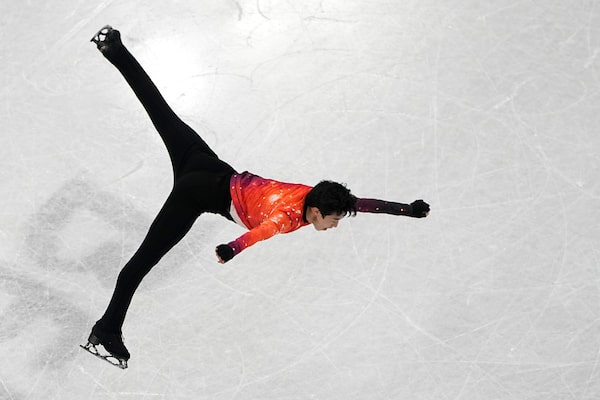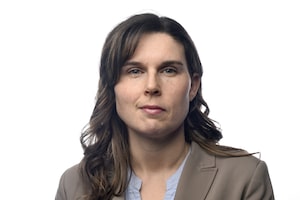
U.S. figure skater Nathan Chen competes in the men's free skate at the Beijing Olympics on Feb. 10.Jeff Roberson/The Associated Press
Nathan Chen left no doubt that he’s the world’s best male figure skater.
With a long program set to Elton John’s Rocket Man and popping with five quadruple jumps, the American blew away the competition for gold at the Beijing Winter Olympics on Thursday.
The California native placed a painful fifth at the 2018 Pyeongchang Games. Now, the 22-year-old Chinese-American has won in Beijing – the city where his mother was raised, and his parents met.
The showdown between Chen and Yuzuru Hanyu, Japan’s two-time Olympic champion, was billed as one of the marquee events of these Winter Games. But it didn’t turn out as expected.
Hanyu fell attempting a jump that no man has ever landed in a competition, and he finished in fourth place. Instead, two other Japanese skaters took silver and bronze, Yuma Kagiyama and Shoma Uno.

Yuzuru Hanyu of Japan falls during his performance.Natacha Pisarenko/The Associated Press
“In my mind I did not feel like I was the favourite to win,” said Chen, who won both the short program and free skate by large margins. “As soon as you hear the name Yuzuru Hanyu, you’re like, okay, well, this is gonna be hard, as well as the other two Japanese men.”
Canadian Keegan Messing finished in 11th spot.
It was a highly anticipated event, but another figure skating story also loomed over the day.
The International Olympic Committee had yet to say how it will act on a reported positive drug test by a Russian skater. Its deliberations on the matter has delayed the awarding of medals for the team event.
Russian Olympic Committee athletes won that event, the U.S. was to receive silver and the Japanese bronze. Canada placed fourth, so is in line possibly for an upgrade.

Masked and physically distanced fans watch Hanyu compete at the Capital Indoor Stadium.Natacha Pisarenko/The Associated Press
Like at all venues at these Olympics, a smattering of local fans spotted the stands Thursday at the men’s event, masked and meticulously distanced from one another inside Beijing’s Capital Indoor Stadium. But the media presence was anything but small for some of the most famous athletes competing at these Games. There was a fascination over who would win, but also whether Hanyu would make history.
Quads have become a dominant feature in men’s figure skating over the past decade – physically demanding jumps that require four mid-air rotations. The best men include at least four of these in their long programs. This men’s Olympic event was absolutely brimming with quads, and Hanyu attempted a particular quad no man had landed in competition – the quad axel.
Hanyu had entered the final day in fifth place after a tough outing in his short program. Behind in scoring didn’t stop him from trying something big.
An absorbing silence fell over a throng of reporters gathered and watching as the 27-year-old Japanese skater attempted to land the first quadruple axle in a competition. The back-to-back Olympic champ, dressed in a gauzy mint shirt covered in gold flowers, leapt into the air, rotated and fell on the axel. It prompted a loud reflexive gasp from the gathered media. He fell a second time in the program as well.
“Over the years, he’s been notorious for the best axel ever, essentially,” said Chen of Hanyu. “I’ve just been really lucky to be able to have the opportunity to compete against him and skate at the same time as him. He’s done so much for the sport and progressed the sport in ways I don’t think was imaginable.”
Hanyu still scored the third-highest free skate, despite the falls. “I have to be proud of the two titles of the Olympics,” said Hanyu, also a two-time world champion. He expressed no regrets in his short English interview.
Chen shares the podium with Japanese competitors Yuma Kagiyama, left, who won silver, and Shoma Uno, who took bronze.Evgenia Novozhenina/Reuters
So Chen takes over as the new Olympic champion.
It’s been a long four years since his disappointing finish at the Pyeongchang Games. There, Chen made a series of mistakes in his short program that left him in 17th place. But then he bounced back with a record-shattering long program that included six quads, and that boosted him up to fifth place. That long program suggested Chen could stand atop an Olympic podium someday. He’s been waiting since.
He and coach Rafael Arutyunyan told stories about Chen’s mother giving cash to pay the coach when her son was young, and the coach would turn around and hand it back to the skater. In Beijing, he’s been one of the biggest American faces of the Games.
Chen smashed a record with his short program, all the while wearing an elegant black suit designed for him by Vera Wang. He’s sponsored by Nike, has studied at Yale and calls another Chinese-American figure skater his idol: two-time Olympic medallist Michelle Kwan.
“Having athletes that look like you certainly gives you the hope that you can do the same,” said Chen. “And Michelle Kwan was certainly that for me.”
One of Chen’s teammates, Vincent Zhou, returned a positive COVID-19 test in Beijing, raising some worries that Chen, too, might be positive. The concern was short-lived. Chen also had to combat stress about making mistakes, like he did in 2018. Chen has worked intensively with a sports psychologist for the past year.
Chen's long program was set to Elton John's Rocket Man.Aleksandra Szmigiel/Reuters
Chen shines with his variety of quads – which he hits more consistently, and with more height and style than nearly anyone else. The best men in this event showed quads are here to stay, and landing lots of them in a program are essential for contending.
“These guys, they are the best in the world and I am a couple quads short of having a medal chance so really I came here hoping to place top six,” said Messing, the Canadian who placed 11th and planned two in his free program, but tripled one of them.
“It’s just absolutely amazing the level that the sport has grown in the last eight years. … This is by far the strongest I think the men’s event has ever been in the history of figure skating.”
Messing’s trip to Beijing has been short because he arrived in Beijing late after recovering from a positive COVID-19 test before departure. While his teammates left for the Games, Messing isolated in Vancouver, and missed the team event last week. Instead he arrived just in time for the men’s individual event.
“I am very upset that I didn’t get to do the team event. I do feel like I let my teammates down on that,” said Messing.
There is much more figure skating to come in Beijing, starting with the ice dance competition, which starts this weekend.
Beijing 2022: More from The Globe and Mail
The day in photos
Ice dancing in depth
What kinds of skill and artistry go into a winning ice-dance performance? Videographer Timothy Moore spoke to skaters Piper Gilles and Paul Poirier and one of their coaches to find out. He explains what he learned on The Decibel. Subscribe for more episodes.
Sports columnist Cathal Kelly
With festering doping story, Russia returns to its black-hat glory
U.S. skier Mikaela Shiffrin’s bad run in Beijing makes her even more compelling as an athlete
That’s it, that’s all, the Peng Shuai saga is over. Right?
Our Olympic team has a daily newsletter that lands in your inbox every morning during the Games. Sign up today to join us in keeping up with medals, events and other news.






 Rachel Brady
Rachel Brady